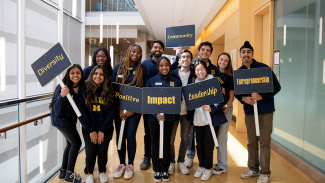More Than Numbers. Your Personal Experiences and Reflections Count in Admissions Decisions, Too.

In admissions, we are very focused on the numbers: the number of applicants, the number of admits, the admits’ average high school GPA, or other numbers that we believe reflect their perceived academic potential.
Rarely do admissions professionals talk about the rich qualitative information we gather from college applications. However, qualitative methods are important because they illustrate the applicant’s academic and personal experiences beyond the numbers and are an important part of our review process.
For the Michigan Ross BBA admissions process, the qualitative information we gather about your learning and the self-reflection of that learning is very important when making final admissions decisions. Quantifying these data points is not easy, and perhaps that is why we do not see a lot of transparency related to qualitative data. However, I believe sharing this information can be helpful to give a full picture of our incoming class and what we look for in applicants.
An applicant’s ability to show what they know and can do in the classroom or another real-world setting can be just as important as choosing the right answer on a standardized test. This is why Michigan Ross has incorporated several elements into our application to provide students an opportunity to do so. The Business Case Discussion looks for an applicant’s ability to problem solve, while also giving the Admissions team a glimpse into their worldview or community. The Artifact allows students to demonstrate their learning in action. These two components are known as Performance Assessments and are considered the next frontier of college admissions.
So let us dig into the 2022 qualitative data from both the Business Case Discussion and the Artifact to highlight a few exceptional samples for each. Remember these are just a few samples - we want you to pull from your own experiences if you decide to apply to Michigan Ross.
Business Case Discussion samples
The prompt for the Business Case Discussion is to choose a current event or issue in your community and discuss the business implications. Applicants are asked to propose a solution that incorporates business principles or practices in approximately 500 words. The review panel will look for creativity, drawing connections, and originality.
A small community problem
Chosen problem: A local orchard is selling 181 acres
Business implications: 1. The orchard has culture/community value. 2. The community is divided over the sale. 3. There is future concern for the land.
Solution summary: Involve the community and assess the local needs. There is a more rural community with a farming population and thus a farm-to-table restaurant could be created.
Reader comment: “Although these are just suggestions, the applicant’s ability to look at the situation and create a plan that accommodates the needs of the various sides is impressive. I really liked the farm-to-table idea coming from the beloved orchard. This essay is well thought out with an eye for creating a plan that keeps all happy without putting excessive strain on the infrastructure.”
A large problem that is localized
Chosen problem: Food insecurity in their hometown of Detroit
Business implications: 1. Describes urban areas as food deserts. 2. An issue that disproportionately affects the Black community. 3. Ties the problem to lack of financial means in low-income areas.
Solution summary: Create a non-profit called Nutrition Haven that provides free food services for low-income individuals, including educational courses on cooking healthy foods on a budget, and partnering with homeless shelters to provide nourishing meals. The idea involves fundraising with Black-owned businesses and restaurants to host cookouts with music, and financial sponsorship by such businesses.
Reader comment: “The topic of food insecurity is not really unique (as a topic in these discussions), but the applicant provides a well-thought-out and multi-faceted solution that goes beyond providing food itself, and looks to create empowerment within the community by education on healthy food choices and cooking.”
A creative solution to a common problem
Chosen problem: Disappearance of local GameStop stores - the franchised retailer that was in the news for closing outlets
Business implications: 1. Loss of local business revenue to larger companies not within the community. 2. Gaming community no longer has a physical space to gather.
Solution summary: Create a gaming cafe to replace the community lost. The cafe would charge an hourly rate for customers to use the space, could partner with food trucks or food delivery services to avoid high startup costs of serving food, and would work with gaming organizations to host tournaments.
Reader comment: “Good business case. Identifies a local issue that they have a personal connection with. The solution is derivative but unique to this specific situation. It addresses the drawback of food service, and provides an alternate solution. It shares how a favorite video game store can reinvent itself, including thinking about marketing of this new concept and how to finance it and keep costs low, and also how to involve other local businesses. Well done.”
Artifact samples
The prompt for the Artifact is to upload a document or artifact that represents something significant about your life to show your learning in action. Then describe how your artifact demonstrates your learning in action in approximately 250 words.
School-based project
Chosen artifact: Braiding hair culture project
Artifact form: Video
Summary: Student writes about their Nigerian heritage and the importance of braided hair within their culture. The applicant shares that their mother never learned how to braid so the applicant taught themself as a way to both express their culture and to feel closer to their relatives. This experience led the applicant to write a mini-book for the Personal Project International Baccalaureate course.
Reader comment: “A really nice and unique reflection on self-discovery, persistence, and initiative. Love that the applicant translated this to a class project where they were able to reflect further on their culture and family heritage. A well-written and unique artifact selection.”
Sport experience
Chosen artifact: X-ray of a compound dislocation
Artifact form: X-ray image
Summary: Applicant submitted an X-ray image showing a compound dislocation of their ring finger. Applicant discusses the baseball injury that allowed them to learn a lot about themselves after taking six months to recover and to play again. Being physically limited was a humbling experience for the student, in which they had to learn to ask for a lot of help from others and to develop patience during therapy sessions.
Reader comment: “This is an unusual artifact choice, but certainly one that grabs my attention. The reflection is beyond the typical sports injury type of artifact, where the student truly does display humility and what they learned about themselves in overcoming adversity. Applicant also discusses these newfound skills and characteristics that will be utilized post-injury when reflecting on sports as their passion, their new outlook on life, and how to have empathy for others. Nice touch.”
Extracurricular activity
Chosen artifact: Scout badges
Artifact form: Image of personal item
Summary: Applicant shares a picture of four scout badges that they were awarded after teaching younger scouts STEM and coding skills. To explain the concepts of computer science and coding, they used honey bees and honeycombs as a way to engage younger scouts.
Reader comment: “While we see boy and girl scouts badges quite often, this artifact is unique because of the creative teaching techniques that were employed to teach young children coding. I can certainly see why they received four badges for this work! The reflection is well-written and very personalized, and also highlights the student’s community service work based on their own passion for computer science.”
Important takeaways from these qualitative data points
What can be taken away from these experiences is that our Michigan Ross BBA admissions process looks at more than just the numbers that are provided in an application. We are looking for experiences that show leadership, community building, empathy, and collaboration, to name a few. We are also looking for actual demonstrations of what students know and can do in real-world situations that relate to what they may have learned in their high school curriculum. The University of Michigan often uses the tagline “Leaders and Best”, and at Michigan Ross we truly believe that we are preparing the next generation of leaders, and this ability to demonstrate when you are at your best is often found in the qualitative experiences submitted in your Ross Admissions Portfolio.





